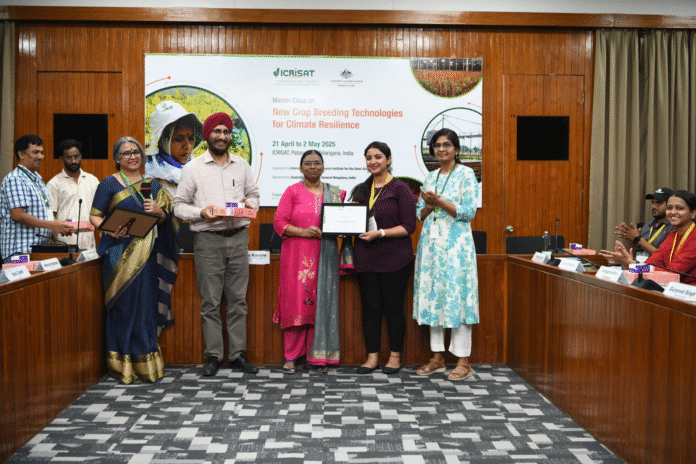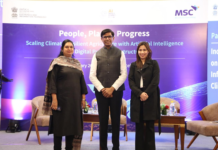
Hyderabad, India – The International Crops Research Institute for the Semi-Arid Tropics (ICRISAT), in collaboration with the Australian Consulate-General Bengaluru, successfully concluded a two-week intensive master class on new crop breeding technologies for climate resilience.
The program held at the ICRISAT headquarters from 21 April – 2 May 2025, brought together 29 participants, including early-career researchers, scientists, academicians, and industry leaders to explore innovative crop breeding strategies to tackle the global challenge of climate change.
Building on the success of previous acclaimed programs held in 2022 and 2023, this was the third edition of the master class organized by ICRISAT’s Dryland Academy, under the leadership of Padmaja Ravula, principal scientist and cluster leader for knowledge and capacity development.
The course struck a balance between technical depth and practical application, and was expertly coordinated by Janila Pasupuleti, cluster leader for crop breeding, and Sean Mayes, global research program director for accelerated crop improvement at ICRISAT.
The master class commenced with a thought-provoking keynote address by Himanshu Pathak, director general, ICRISAT, who addressed the critical intersection of climate change and agriculture. Highlighting efficient action points for a climate-friendly future, Pathak said,
“To combat climate change, we must act decisively, developing climate-resilient crops, embracing precision agriculture, and bridging traditional wisdom with cutting-edge innovation. But science alone is not enough. We must empower farmers with knowledge, invest in next-gen researchers, and ensure women and youth lead this transformation.”
A key feature of the program was the emphasis on fostering an inclusive learning environment. The significant representation of women among the participants enriched the sessions, fostering open dialogue and meaningful knowledge exchange. Participants shared that the supportive atmosphere encouraged active engagement and gave them the confidence to contribute their perspectives freely.
The program also fostered strong collaborations with Australian institutions. Esteemed researchers and academicians from the University of Queensland and the University of Western Australia shared their expertise, enriching the learning experience. The program further benefited from the active participation of project collaborators and partners, as well as participants from ICRISAT’s hosted institutes, creating a vibrant and diverse learning community.
Throughout the course, attendees were introduced to the latest trends and advancements in crop breeding. Experts explored how emerging technologies like artificial intelligence (AI) are transforming plant breeding, making it faster, more efficient, and scalable.
Elaborating on the significance these new advancements, guest lecturer, Lee Hickey, centre director, ARC Training Centre for Predictive Breeding, University of Queensland, Australia, said,
“AI in breeding allows researchers to predict crop traits more accurately, enabling the creation of new cultivars with improved resilience.”
The concept of crop product design (variety) and the importance of breeding schemas were central to the course. Participants also learned how genetic gain—a crucial performance indicator of breeding—is essential for developing climate-resilient crops.
Pasupuleti explained that the program was designed to teach best practices in crop product design, including developing elite parents and cultivars for both public and private sector institutions. She also introduced key performance indicators (KPIs) for breeding programs, emphasizing the need to move beyond measuring success by the number of varieties released.
The training covered innovative approaches like predictive breeding, machine learning (ML), and AI, while outlining the elements of a modern breeding program to help trainees grasp its context and opportunities.
As climate challenges intensify, such initiatives are pivotal in equipping scientists to develop resilient, high-yielding crops. This course underscores ICRISAT’s commitment to strengthened partnerships, capacity building, and empowering the next generation of agricultural scientists.
IndiFoodBev — authentic, impactful and influential
An English-language food and beverage processing and packaging industry B2B platform in print and web, IndiFoodBev is in its third year of publication. It is said that the Indian food and beverage industries represent approximately US$ 900 billion in revenues which implies more than 20% of the country’s GDP. Eliminating the wastage on the farmside can help to deliver more protein to a higher number of the population apart from generating sizable exports. The savings in soil, seeds, water, fertilizer, energy and ultimately food and nutrition could be the most immense contribution that country is poised to make to the moderation of climate change.
To improve your marketing and grow sales to the food and beverage processing and packaging industry, talk to us. Our research and consulting company IppStar [www.ippstar.org] can assess your potential and addressable markets in light of the competition. We can discuss marketing, communication, and sales strategies for market entry and growth.
Suppliers and service providers with a strategy and budget for targeted marketing can discuss using our hybrid print, web, video, and social media channels to create brand recognition linked to market relevance. Our technical writers are ready to meet you and your customers for content.
The second largest producer of fruit and vegetables in the world is continuously expanding processing capacities and delivery systems with appropriate innovative technologies. We cover product and consumer trends, nutrition, processing, research, equipment and packaging from farm to thali. Get our 2025 media kit and recalibrate your role in this dynamic market. Enhance your visibility and relevance to existing markets and turn potential customers into conversations. Ask for a sample copy of our bi-monthly in print or our weekly IndiFoodBev eZine each Wednesday.
For editorial info@ippgroup.in — for advertisement ads1@ippgroup.in and for subscriptions subscription@ippgroup.in
Naresh Khanna – 10 February 2025
Subscribe Now










